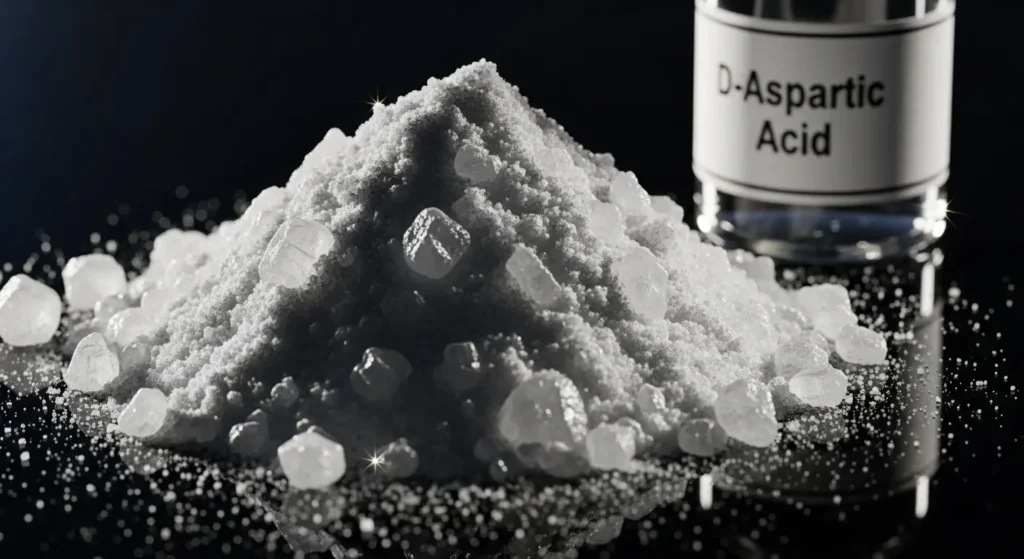Worried that d-aspartic acid hair loss could be a hidden side effect of your supplement routine? D-aspartic acid (DAA) is often marketed for boosting testosterone and fertility, but many people wonder whether it could also contribute to hair thinning.
In this article, we’ll explore what DAA is, what science says about its effect on hormones and hair, the potential risks, and safer alternatives. Backed by medical insights and scientific evidence, this guide will help you make informed choices about your health.
What Is D-Aspartic Acid?

The Two Forms of Aspartic Acid
Aspartic acid is a naturally occurring amino acid that exists in two forms:
- L-aspartic acid – plays a role in protein synthesis and overall metabolic function.
- D-aspartic acid (DAA) – involved in hormone regulation, particularly testosterone and luteinizing hormone (LH).
Both forms occur naturally in the body, but supplements specifically use D-aspartic acid because of its potential hormonal effects.
How D-Aspartic Acid Affects Hormone Regulation
Research suggests that DAA can stimulate the release of luteinizing hormone, which in turn signals the testes to produce more testosterone. This is why many athletes, bodybuilders, and men with fertility concerns turn to DAA supplements.
Does D-Aspartic Acid Affect Hair Loss?
Mechanisms: Hormone Increase → Hair Loss Risk
Since male and female pattern baldness (androgenetic alopecia) is strongly linked to dihydrotestosterone (DHT), a derivative of testosterone, raising testosterone levels through DAA supplementation could potentially increase DHT levels. Higher DHT levels may accelerate hair follicle shrinkage, especially in genetically predisposed individuals.
What the Science Says
- Human studies are limited: Some research shows DAA can temporarily boost testosterone, but other trials found no significant long-term effects.
- No direct evidence: Currently, no clinical studies have proven that DAA directly causes hair loss.
- Indirect risk: By potentially elevating testosterone and DHT, DAA could worsen hair loss in those already prone to androgenetic alopecia.
D-Aspartic Acid and Scalp Health
Amino Acid Role in Hair Structure
Amino acids, like aspartic acid, are vital for:
- Keratin production – the protein that makes up hair strands.
- Collagen synthesis – essential for scalp support and elasticity.
- Enzyme function – supports metabolic processes that nourish hair.
This means DAA itself isn’t inherently “bad” for hair; in fact, amino acids are building blocks of healthy growth.
Topical vs. Oral Use
- Topical products with amino acids may directly nourish the scalp without affecting hormones.
- Oral supplements, however, interact with hormone pathways—potentially influencing hair in unintended ways.
Benefits, Risks, and Safety
Potential Benefits of D-Aspartic Acid
- Supports testosterone production (short-term boost)
- May improve libido and sexual health
- Studied for male fertility support
- May enhance energy levels for athletes
Possible Risks and Side Effects
- Headache, irritability, or mood changes
- Gastrointestinal discomfort
- Potential hormone imbalance
- Possible acceleration of hair loss in genetically sensitive individuals

Safety Guidelines
- Standard dosages range between 2–3 grams daily for short cycles.
- Long-term use is not well-researched.
- People with hair loss concerns should consult a doctor before supplementation.
FAQs: D-Aspartic Acid and Hair Loss
Q1: Can D-aspartic acid worsen male or female pattern baldness?
Yes, indirectly. By raising testosterone (and possibly DHT), it may accelerate hair loss in predisposed individuals.
Q2: Is topical application safer than oral use?
Topical amino acid products don’t affect hormones, so they are generally safer for hair health.
Q3: How long before side effects appear?
Reports vary, but some users notice hair shedding within weeks of supplementation.
Q4: What’s the safe dosage to avoid hair issues?
Most studies use 2–3 g/day for up to 2 weeks. Long-term safety is unclear, especially for hair.
Q5: Are there better alternatives for supporting hair?
Yes, nutrient-rich diets, biotin, amino acid serums, and clinically proven treatments like finasteride and PRP therapy.
Final Thoughts
D-aspartic acid may provide short-term benefits for testosterone and fertility, but its effect on hair health remains uncertain. If you’re genetically prone to hair thinning, it’s wise to avoid supplements that alter hormones. For those concerned about hair loss, safer alternatives like balanced nutrition, amino acid-based topicals, or medically guided treatments are recommended.
If you’re experiencing hair thinning or worried about supplements like D-aspartic acid, don’t leave your hair health to chance. Book a consultation with Dr. Rana Irfan in Islamabad today for expert diagnosis and a personalized treatment plan to protect and restore your hair.
